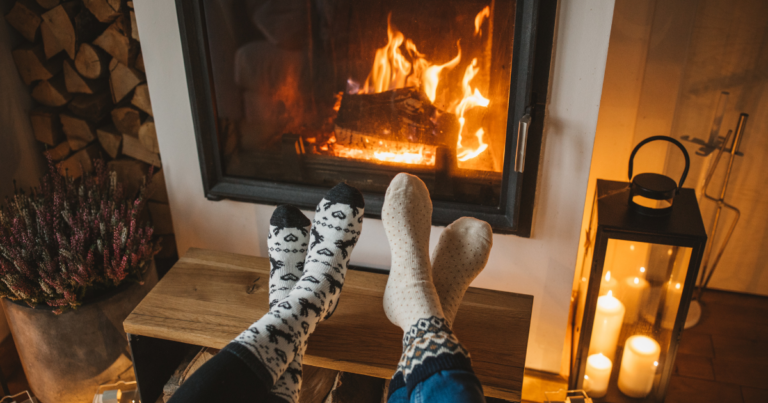Is your gas bill going up quicker than you can turn the thermostat down? With energy costs on the rise (again), we’re sharing some of our best tips and tricks to help you save money on heating while still keeping your home warm and cosy this winter.
But, before we get into the tips – let’s start by answering the most common question our customers ask…
If you’re worried about rising gas bills, you’re probably wondering, “Is it cheaper to leave the heating on constantly?” ” How long should I leave the heating on for?” ” Is it more expensive to keep turning the heating on and off?”
Okay, let’s answer this age-old debate.
According to the experts over at Energy Saving Trust (and we agree) leaving the heating on low all day isn’t actually cheaper.
Why?
Because your home wastes energy through windows, doors, roofs, walls, and floors. So if you’re leaving your heating on all day, it’s wasting energy all day. Whereas if you only use your heating when it’s needed, you’re losing less energy – meaning your boiler doesn’t have to work as hard.
Instead, we’d recommend setting your thermostat on a timer, so your heating kicks in only when needed.

Now that we’ve cleared up the big question about whether to leave your heating on, let’s dive into some practical tips to help you lower that gas bill without needing to wear 20 layers of clothing around the house.
This one might sound obvious, but turning down your thermostat by just 1°C can make a big difference to your gas bill. Most homes are overheated, and lowering the temperature a bit won’t drastically affect your comfort but can cut heating costs. For every 1°C you turn the heating down, you can save around 10% on your bill.
We always tell people to aim for around 18-20°C when you’re home, and drop it down lower (or turn off) at night or when you’re out.
If you haven’t got one already, a smart thermostat like the Nest Learning Thermostat is a game-changer for saving on heating.
After just a week of use, Nest learns your preference and will automatically adjust the heating to suit your routine. It even switches to Eco mode when it senses you’ve left the house, so you’re not wasting energy. Plus, you can control it remotely, meaning you can turn the heating down while you’re out and boost it before you get home.
Using draught excluders on doors, sealing up window gaps, filling cracks around skirting boards, or any other nooks and crannies where heat might escape are easy ways to prevent heat from escaping.
As you turn on the heating, you might notice that your radiators aren’t warming up as they should. Trapped air could be the cause since it prevents water from flowing properly, meaning your boiler has to work harder.
To fix it, try bleeding your radiators. All you need to do it is grab your radiator key, open the valve slightly until water starts to drip (make sure you’ve got a bowl handy), then close it again. This will help your radiators heat up evenly and more efficiently.
If you’ve got rooms you rarely use, turning off the radiators and closing the doors can save energy. However, there’s a catch – unheated rooms, especially north-facing ones, can become damp over time.
To prevent this, it’s best to turn the radiators back on occasionally to stop the room from getting musty. If your radiators have a frost setting (normally a little snowflake icon), use that instead of switching them off completely. This way, they’ll kick in if it gets extra cold, preventing pipes from freezing while still saving on heating costs.
There’s nothing better than a nice hot relaxing bath, especially on a cold winter’s day. But baths are huge energy guzzlers in the home.
Swapping even just one bath a week for a 4-min shower can help cut your energy bills. It doesn’t seem like much, but over time, those savings add up.

If your boiler is over 10 years old, it’s likely less efficient than newer models, which could be driving up your gas bills. Modern condensing boilers are designed to be over 90% efficient, meaning they use less gas while keeping your home warmer.
Upgrading to an energy-efficient boiler can significantly reduce your gas usage and help prevent costly breakdowns with regular boiler servicing.
For more information on choosing the right boiler, check out our Boiler Replacement Guide.
Saving money on heating doesn’t have to mean living in a cold house. By making a few small changes – like upgrading your thermostat, sealing up draughts, and using your heating more efficiently -you can keep your home cosy without breaking the bank.
So, give these tips a try and see the difference in your gas bill! If your boiler needs attention, feel free to get in touch with us.